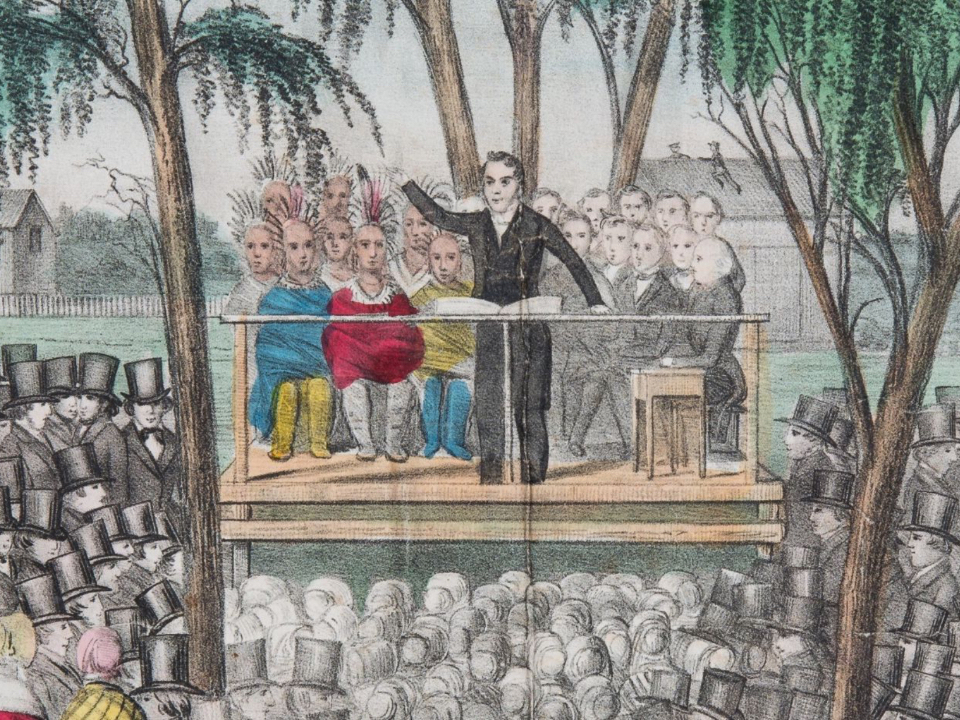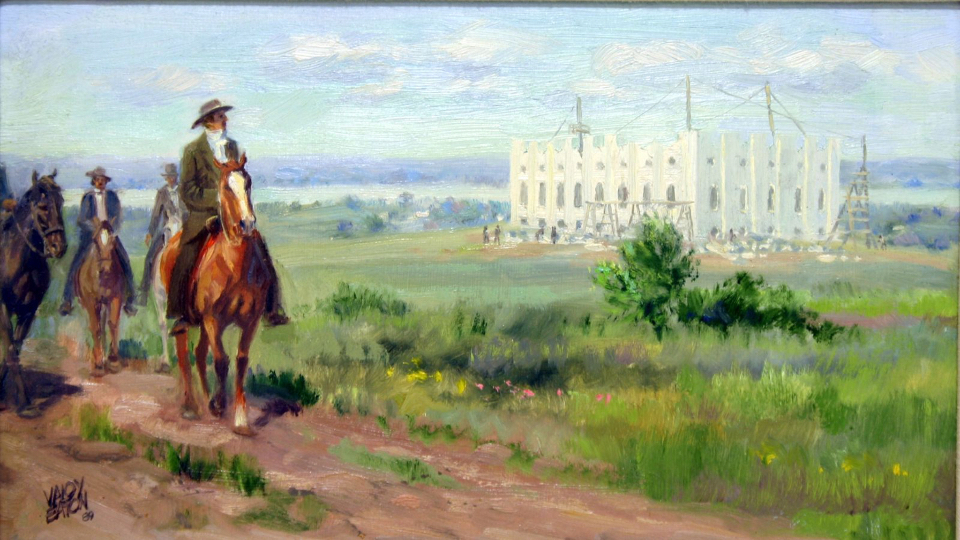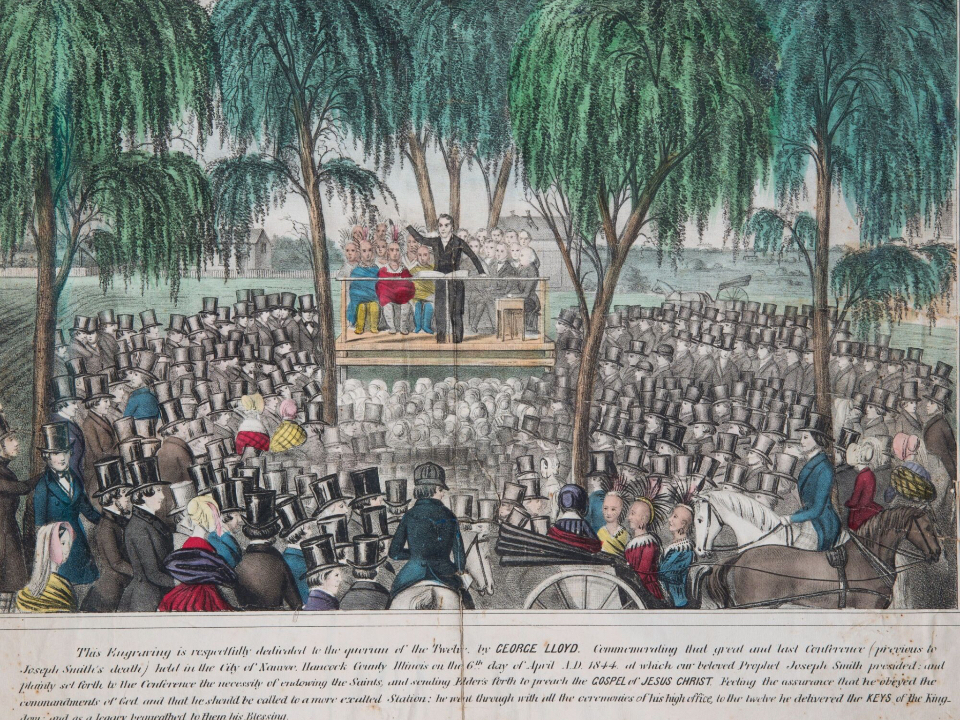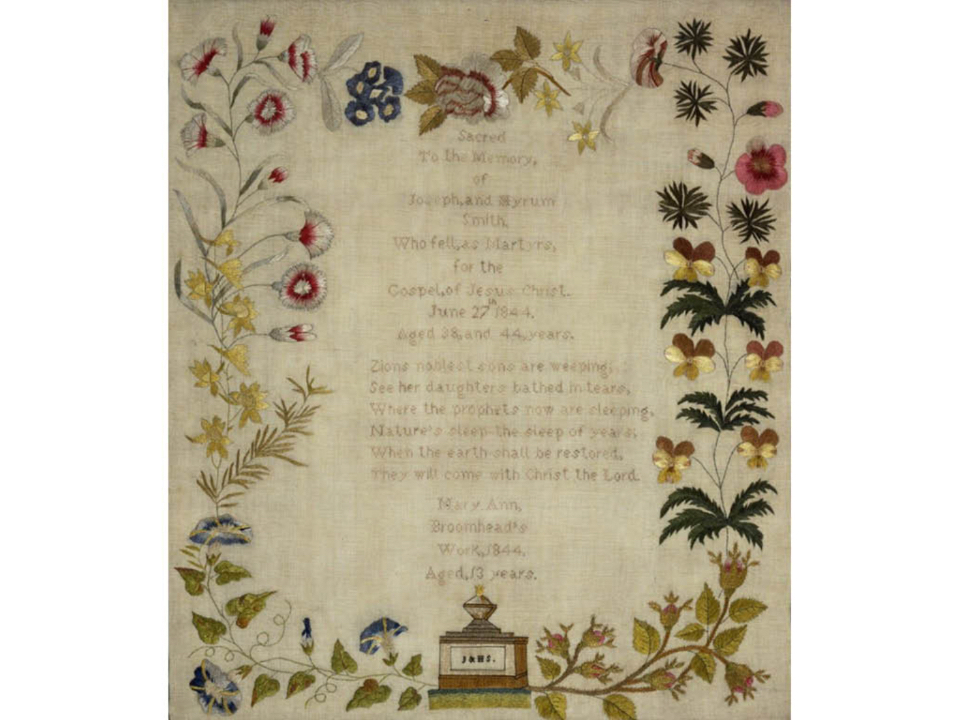
1-JS-Papers-Project-
A depiction of the Prophet Joseph Smith presenting the King Follett discourse. The teachings of this speech and other events of the Prophet’s life can be found in “Documents, Vol. 14” and “Documents, Vol. 15” — the final two volumes of the Joseph Smith Papers Project. Photo by Church History Museum. All rights reserved.
This story appears here courtesy of TheChurchNews.com. It is not for use by other media.
By Joel Randall, Church News
On June 7, 1844, the same month that the Prophet Joseph Smith was martyred in Carthage Jail, critics and enemies of The Church of Jesus Christ of Latter-day Saints published a libelous newspaper called the Nauvoo Expositor.
The following day, Joseph discussed it in a Nauvoo City Council meeting, and the newspaper was eventually declared a public nuisance. Some members of the Church thought this was wrong, but Joseph later revealed he was shown in a vision that “the blood of the Saints [would] flow in the streets” if the Nauvoo Expositor was not shut down.
Joseph was authorized to destroy the printing press and existing copies of the newspaper’s first edition. Although some witnesses claimed this was done in an orderly and law-abiding manner, others saw it as a riot and threatened to attack the city unless Joseph and Hyrum Smith turned themselves in.
“When Joseph goes to Carthage, he is saving the city,” said Dr. Adam H. Petty, a historian and documentary editor with the Joseph Smith Papers Project. “He is saving us by going. And I think he has a pretty good thought that maybe he might not come back from this.”
Historical accounts detailing the last six months of the Prophet’s life were related on April 7 at the Assembly Hall on Temple Square for “A Life Lived in Crescendo: Joseph Smith’s Life and Teachings in 1844.” The lecture, given by Dr. Petty, showcased the completion of “Documents, Vol. 14” and “Documents, Vol. 15” — the final two volumes of the Joseph Smith Papers Project.
“With the publication of the Joseph Smith Papers,” Petty said, “we have more information about the Prophet’s life than any other generation. It is my hope that this enormous work be consecrated for the blessing of the Saints, for the strengthening of their faith in these, the last days.”
- 2-JS-Papers-Project
- 3-JS-Papers-Project-.jpeg
- 4-JS-Papers-Project
- 5-JS-Papers-Project
- 6-JS-Papers-Project-
| Temple Square is always beautiful in the springtime. Gardeners work to prepare the ground for General Conference. © 2012 Intellectual Reserve, Inc. All rights reserved. | 1 / 2 |
The Nauvoo Temple
Joseph Smith lived a full life, Petty said, especially the last six months of it. One highlight of his life was an emphasis on salvation through temple work because, as he said in January 1844, “My only trouble at the present time is concerning ourselves, that the Saints will be divided, broken up and scattered before we get our salvation secure.”
The Prophet of the Restoration also said in March 1844, “The Lord bids me hasten the work in which we are engaged. ... Let me fall a victim to murderous hands if God will suffer it, and I can go with all pleasure and satisfaction, knowing that my work is done, and the foundation is laid on which the kingdom of God is to be reared in this dispensation of the fulness of times.”
Although the temple would not be finished until a year and a half after his martyrdom, “it’s safe to say that Joseph is in a hurry,” Petty said, to see the edifice constructed. Joseph encouraged a greater emphasis on the building of the Nauvoo Temple, even directing Saints to stop construction on the Nauvoo House until the temple was finished.

7-JS-Papers-Project
The painting “Joseph Smith and Nauvoo Temple” by Valoy Eaton shows the Prophet riding to Carthage Jail with the Nauvoo Temple in construction behind him. Photo provided by the Church History Museum.All rights reserved.
Joseph and Politics
On January 29, 1844, Joseph’s friends nominated him for president of the United States to fight against injustice, to which the Prophet was no stranger. The Saints had been forced out of Missouri at gunpoint in 1838, and although many members of the Church had lost property or their lives, no government intervention came to their aid.
Petty said, “Since that point, they had made multiple attempts to gain redress or compensation for the losses they’d suffered in Missouri, but their petitions had fallen on deaf ears. There was no redress forthcoming. And the Saints, and I think Joseph, feel frustrated about this, that they’ve done everything they could to obtain justice, and it’s been denied.”
Joseph’s presidential campaign in 1844 centered around justice and order, such as promoting free trade and sailors’ rights, giving the president full power to send an army to suppress mobs, and ending slavery with a compensated form of emancipation.
This campaign “is a serious fight,” said Petty. “I think they’re seriously doing their very best to put Joseph in the presidential chair. Now, whether they would have been successful or not is an open question; we never have the election because Joseph was killed before it.”
| Temple Square is always beautiful in the springtime. Gardeners work to prepare the ground for General Conference. © 2012 Intellectual Reserve, Inc. All rights reserved. | 1 / 2 |
The King Follett Discourse
In early 1844, Joseph Smith faced allegations that he was a fallen prophet. One way he countered this was by giving the King Follett discourse — which was named to honor Follett, an elder of the Church who had passed away — a speech in April 1844 that lasted over two hours. Although a word-for-word transcript of this conference does not exist, some in attendance took notes that are available today.

11-JS-Papers-Project-
A depiction of Joseph Smith presenting the King Follett discourse — a sermon about the nature of God and the potential of His children — on April 7, 1844. Photo courtesy of the Church History Museum.All rights reserved.
One of the purposes of this sermon was to show both the Saints and enemies of the Church that God was with the Prophet, Petty said. “First of all, he’s dealing with his detractors. And he’s also trying to show the Saints that he is a true prophet, that he is not fallen. So when you read that discourse, if you understand that context, a lot of it is going to make more sense than otherwise.”
One key theme in the King Follett discourse was the nature of God. Specifically, that God has a physical body, that he dwelt on an earth and that His children have the potential to become like Him.
Petty’s favorite part of the discourse is when Joseph Smith said, “You never knew my heart. No man knows my history. I cannot tell it. I shall never undertake it. If I had not experienced what I have, I should not have known it myself. ... When I am called at the trump of the archangel and weighed in the balance, you will all know me then.”
“I always keep that in mind, that there’s always more to learn and we don’t have everything right in front of us,” said Petty. “I look forward to the day where I get to talk with Joseph. I hope he’ll shake my hand. I’ll say, ‘Joseph, I put in a lot of hours on these books. Can you answer a few questions for me?’ And if I play my cards right, he just might.”

12-JS-Papers-Project
A needlework sampler created by 13-year-old Mary Ann Broomhead as a tribute to Joseph and Hyrum Smith shortly after their martyrdom. Photo by Church History Museum. All rights reserved.Copyright 2023 Deseret News Publishing Company.